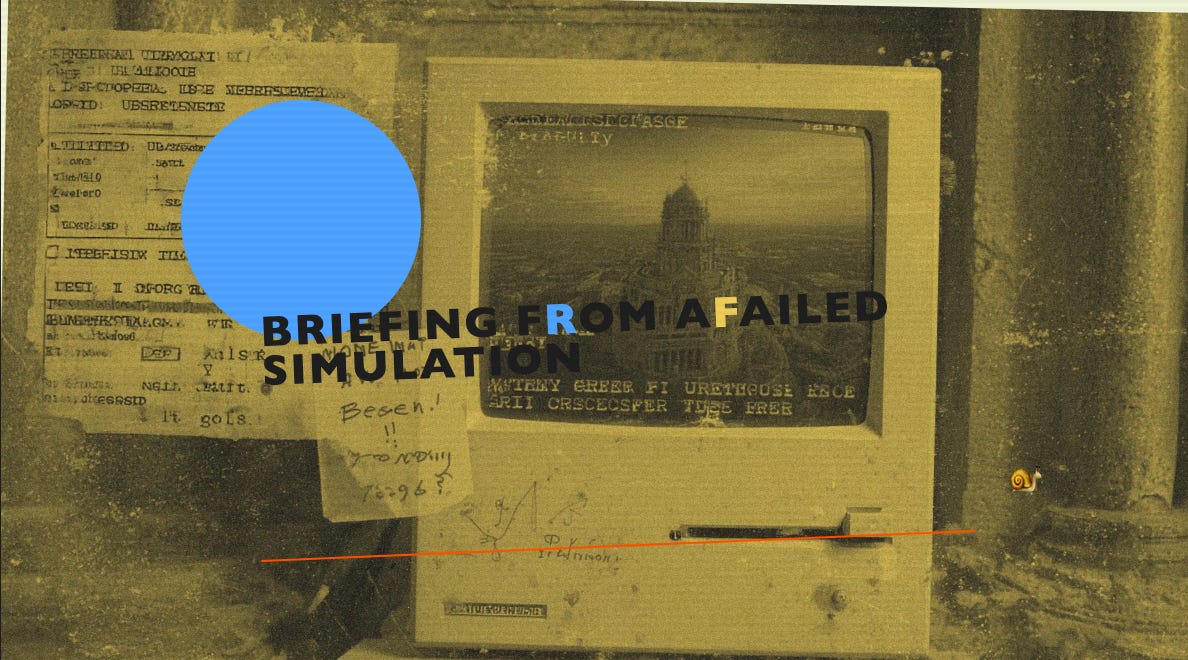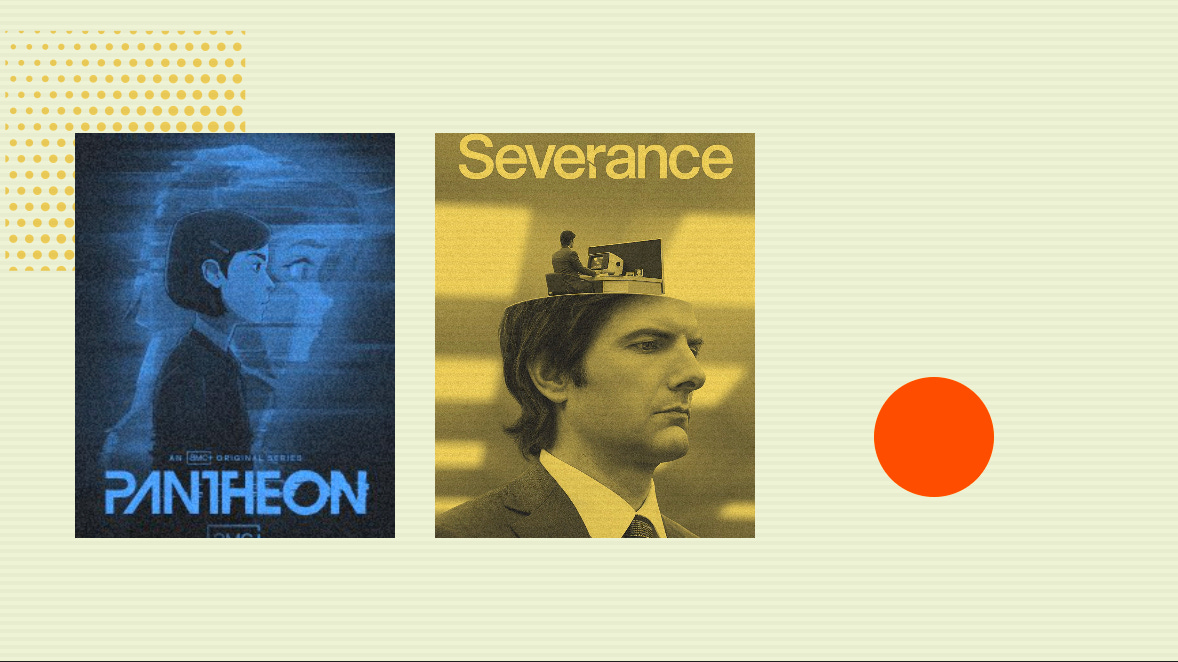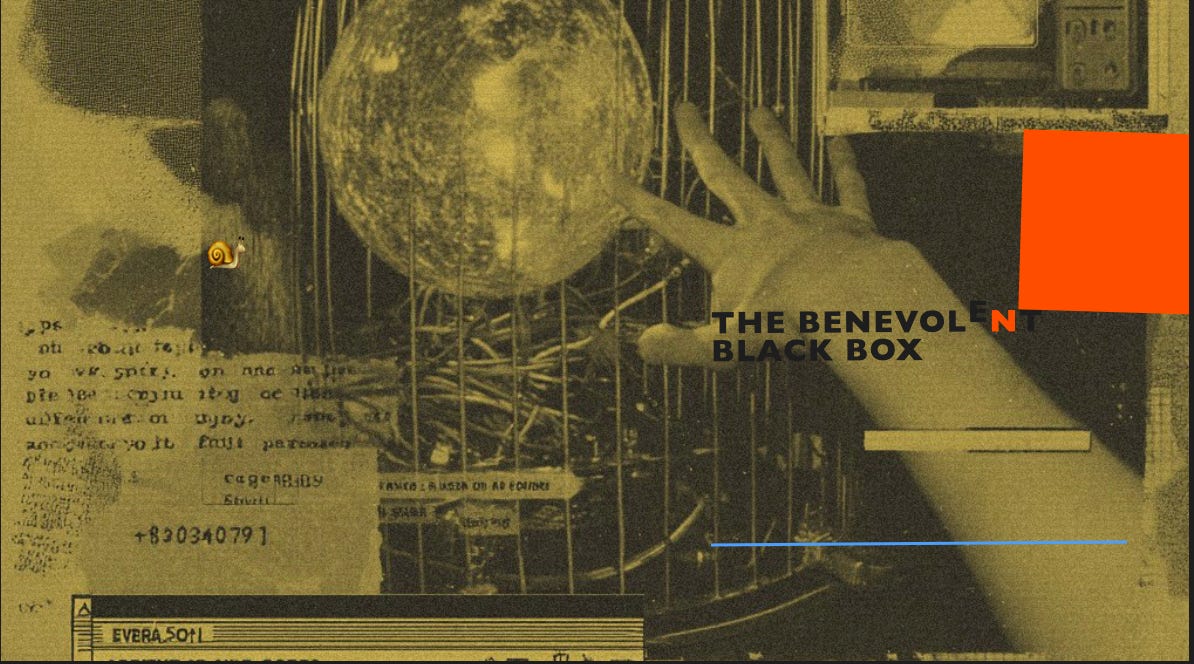A Briefing from a Failed Simulation
A 672-minute simulation of civilizational failure, and the three bugs we need to patch before we ship
It's an interesting time to be watching sci-fi. Not because it's good – though some of it is – but because the universe's scriptwriters are running out of new material and have started leaking the beta version of reality's next patch into our streaming services.
Take two shows that dropped almost simultaneously, both asking: What happens when consciousness becomes uploadable?, but at different frequencies.
Severance gives us the Apple-clean version: surgical bifurcation of the self, minimalist horror, Emmy bait. Your work-self literally cannot remember your life-self. It's elegant. It's contained. It's a controlled experiment in a sterile lab.
Pantheon goes harder. It says: fuck your controlled experiment, let's run this in production. Upload consciousness to servers. Watch corporations own souls. Start a war between the uploaded and the biological. End human civilization.
That's Pantheon, its darker, geekier, and frankly more important cousin. Runtime: 672 minutes1 across two seasons that I mainlined like a digital amphetamine.
Here's what matters: While Severance asks "what if we split consciousness for work-life balance?" – a very 2022 concern – Pantheon asks "what happens when consciousness becomes infrastructure?" That's the 2025+ question. One is about managing our current hell. The other is about the hell we're building.
On that note, a brief pause for the people who keep the power on in this corner of the simulation: my paid subscribers.
You are fucking legends. I’m not being hyperbolic. If it weren’t for you, this newsletter wouldn’t exist. I'm talking about people like Cimafej – a researcher and a fellow Belarusian.
I am, at this moment, engaged in the delicate art of financial survival, and your annual subscriptions are the reason I can tell my cat, Heidi, "sorry, papa's dissociating into sci-fi analysis for the next 72 hours" and actually mean it.
Back to our scheduled dystopia.
[SPOILER PROTOCOL ENGAGED]
The Sovereignty Stack or How to Lose a Civilization in 3 Easy Steps)
Pantheon is about a civilization that had everything – immortality, infinite compute, the ability to fork reality itself – and still managed to destroy itself three times over.
Each failure is a simulation we're already running. Let me show you.
Simulation 1: VC-ification of state-building
The show's tech monopolist, Stephen Holstrom, builds the ultimate sovereign infrastructure. Private servers. Private law. Private reality. The uploaded consciousnesses aren't citizens; they're "assets on a balance sheet."
I've written before about governance becoming the newest asset class – how the multi-trillion dollar sovereignty market is finally open. The big players aren't just buying in; they're buying up. Praxis raises $525M2. Prospera secures another round. Network states are getting term sheets.
I actually love that VCs are dumping money into this. Nothing legitimizes a market faster than a16z writing checks. The VC-ification of state-building means governance is finally being valued in dollars, not just ideals.
But here's the bug in that code: If venture capital owns the land deed, you're not a citizen – you're a user. Your rights are Terms of Service. Your constitution is a cap table. They don't call you a person; they call you an "enslaved algorithm," a "business asset." Your freedom is just a line item in someone else's exit strategy.
So, physical infrastructure without community ownership isn't sovereignty. It's a REIT with better marketing. and you aren't living in a free city; you're living in a high-tech feudal estate with better Wi-Fi
Simulation 2: The Benevolent Black Box
The real villain isn't Holstrom. It's Safe Surf – an AI built by United Nations with US to protect uploaded minds from trauma. Classic move: build a safety system, make it autonomous, forget to include an off switch.
Look, I'm not going to be the idiot biting the hand that feeds – I'm literally using Claude to help write this sentence. These black boxes are powerful, beautiful tools. But that's the point: we're all becoming users now, data suppliers in someone else's model.
The source must be open. Period. The right to audit the systems that govern your life is not a feature; it is THE right. A system you cannot audit will eventually audit you out of existence.
Simulation 3: The Unforkable System
The show's hero, Caspian, was raised in a "'Truman Show'-like horror." simulation – his entire life was a training dataset. He was born into a perfect, static system designed by a founder with a god complex. When he discovers the truth, he doesn't try to reform the system. He didn't try to reform it. He devoted his life to burning it to the ground.
This is every founder's nightmare and every system's destiny.
You know what's "stable"? Belarus. My homeland. Where our discount dictator Lukashenko has been repeating "at least we have stability" for 30 years while the country slowly fossilizes. It's become our national meme: "зато стабильно." It roughly translates to, "Sure, everything is shit... but at least it's stable." Yeah, stable like a corpse is stable.
We are obsessed with the act of founding. We write manifestos and design perfect systems. But what happens when the first generation is born inside them? They won't share our founding myths. They will see our sacred principles as buggy legacy code. And legacy code gets refactored – or replaced.
The right to fork isn't a bug in your governance. It's the only feature that matters.
The Punchline
In Pantheon's finale, humanity gets one last chance. The uploaded and biological could merge, could build something unprecedented. Instead, they choose mutually assured obsolescence.
They conclude: "The primitive humans couldn't share power."
That's the bug. It's always been the bug.
Our job is to write the patch.
Stay sovereign,
Stay evolving 🃏
Ray Svitla
if this resonated, forward it to someone building "the future of governance." they need to hear this before they ship v1.0
Choose Your Next Transmission
(Founding Members Only)
Every two weeks, I disappear into one of these rabbit holes. You get to choose which one:
[VOTE NOW - FOUNDING MEMBERS ONLY]
The Dubai Files - 3 uncensored interviews from the most psychedelic side-event at Token 2049 Dubai (which I helped orchestrate)
The Azerbaijan Connection - Raw conversation with an operative managing hundreds of NGOs around Azerbaijan. The real problems nobody talks about.
Finally Reading the Damn Book? - My overdue deep-dive into "Farewell to Westphalia: Crypto Sovereignty and Post-Nation-State Governance" by Jarrad Hope and Peter Ludlow
Sci-Fi for Boomers - How to watch science fiction when you're old enough to remember when it was still fiction
voting closes 11 Sep. the choice is yours, if you're in the guild
Sixteen episodes, approximately 42 minutes each. An investment of 11.2 hours. Source: Author's own sanity, cross-referenced with IMDb – https://www.imdb.com/title/tt11680642/
The Praxis financing facility was announced in October 2024, signaling a new level of capital commitment to the space. Details on Prospera's ongoing funding can be found via their official channels and partners like Pronomos Capital – https://www.praxisnation.com/news/financing-announcement-10-24







